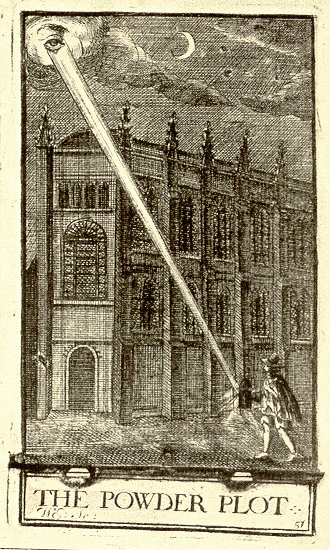Plot-and the Eye Beam
An Icon of deliverance. The eyebeam
of God comes from Right to left. Fawkes is depicted with cloak but no rectangular
overlay. His stockings are also
not well defined. Contrast this
with the image from the book of common prayer of 1729 below which seems
to indicate that the author has seen a few of the later depictions of the
same scene. A third image below seems a bit more abstracted. The
eybeam represents spiritual light which is opposed to the atificial light
of the lntern.
 About the Image:
About the Image:
Source: Gerard,John What was the Gunpowder
Plot. From the Crace Collection, British Museum, Portf. xv. 20. " A
small etching of the House of Lords. Guy Fawkes in the foreground.W.E.exc
1605" "This plate is of exceptional interest as having been executed within
five months of the discovery of the plot, ie. previously to March 25,1606,
the first day of trhe year, Old Style. Guy Faukes is represented as approaching
the House of Commons (St. Stephen's Chapel), not the House of Lords, as
the catalogue says".

About the Second Image
From: "The Book Of Common Prayer"
published by His Majesty's Printer, London, 1729. (Printed by Joseph Hazard,
Stationer's Hall near Ludgate)
This is a mirror image of the one
above-perhaps the artist was using the original engraving plate as a guide.
Note that Fawke's costume is more detailed with some additions which relate
to other earlier images of the scene.

Third Image- from The Book of Common
Prayer.
In this image detail has fallen
away. Fawkes, dressed in red, is almost abstracted. He now wears trowsers
and there is nothing in the sky. The building looks like a stage set facade.
Could the absence of detail indicate the ritualization of the commemoration?
Source: The Book of Common Prayer,
and Administration of the Sacraments, and Other Rites and Ceremonies of
the Church, According to the Use of the Church of England; Together With
the Psalter or Psalms of David, Pointed As They are to Be Sung or Said
in Churches. Oxford: T. Wright and W. Gill from S.
Crowder and W. Jackson, 1774.



